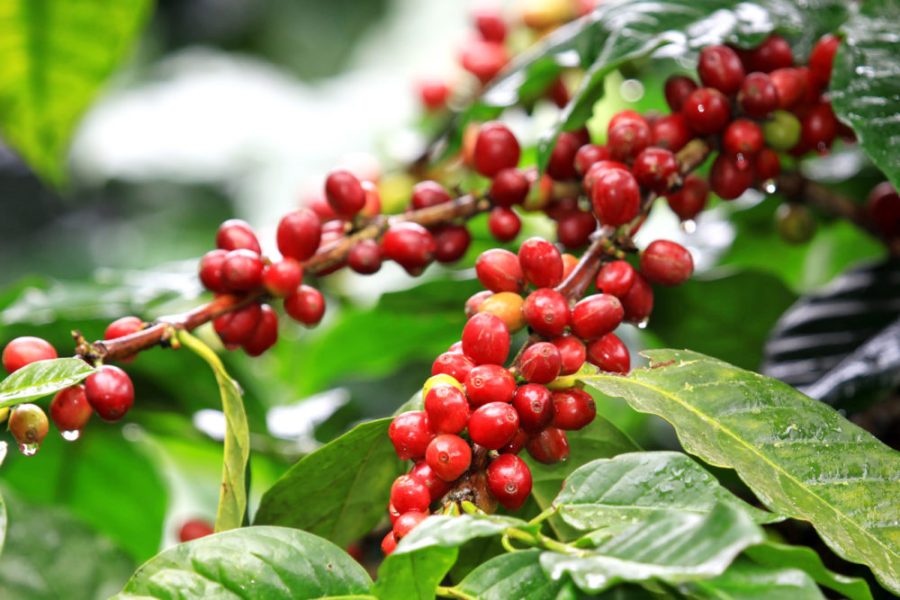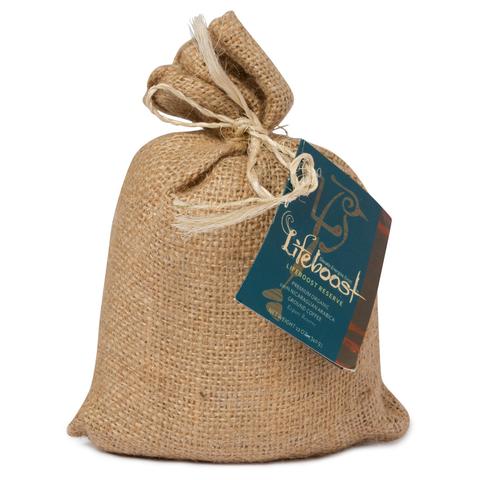Buying the best organic coffee beans is an expression of consumer interest in seeking healthier edibles. People are taking more interest in what they eat and the ingredients therein. The popularity of organic food and by extension, organic coffee, stem from this movement.
With consumer interest comes the deluge of businesses making the desire of the customers come true. Several organic coffee beans are available on the market and there’s a pretty rich selection to choose from. Listed and reviewed here are our top choices for organic coffee beans. Let’s get started.
Editor’s Choice: Lifeboost Healthy Coffee
LIfeboost Healthy Coffee gets the top spot on our list here. The company claims very high standards for its produce and it shows up in the taste of the brew too. Lifeboost Coffee is non-GMO, pesticide-free, and USDA certified organic. And that’s just the start.
This is a high-grown, single-source coffee. It’s sourced from Nicaragua, growing in mountain ranges. Elevation for the coffee plants varies from 4000-5500 feet. With its elevation at nearly a mile above sea level, the coffee cherries take their time to mature.
This, in turn, means that the coffee beans are remarkably flavorful and have the wonderful taste we expect from gourmet coffee.
Lifeboost says their Arabica coffee beans are amongst the top 2% of the global coffee supply. That puts it in the august company of some of the best-known coffees. All beans are shade-grown, which works well with the elevation and helps make the beans more flavorful.
Backed by lab results, Lifeboost says these are low acid coffee beans that go easy on your stomach. The beans are naturally low in acidity and don’t undergo chemical processes to change their acidity. Additional lab tests include checks for hundreds of toxins, including mycotoxins.
Lifeboost Healthy Coffee is available in light, medium, and dark roasts as whole beans or ground coffee. A decaf option is also available, though it’s limited to organic ground coffee.
Coffee Highlights:
- USDA Certified Organic
- Non-GMO, pesticide-free coffee
- Single-origin, high-grown, and shade-grown coffee beans from Nicaragua
- Available in light, medium, and dark roasts
What Are Organic Coffee Beans And What Qualifies As ‘Organic’
So what really are organic beans? It’s more than just coffee grown without chemical pesticides, insecticides, fertilizers, etc. There are some conditions and requirements that organic coffee must complete.
The toughest part to meet is usually the standards. There are no general cohesive standards and countries and organizations might have different ways of defining what they consider organic. For example, common organic standards include those from USDA, EU, Japan, and OCIA.
What qualifies as organic in Japan may not necessarily work with the EU and vice versa. However, for our purpose, the USDA Organic certification will suffice. As the name suggests, the certification is managed by the United States Department of Agriculture.
There are several requirements for this certification. One of these is that no synthetic chemical products should have been used for the past three years. Pesticides, fungicides, fertilizers, and similar products are included in these requirements. Sewage sludge shouldn’t be a part of this setup either.
Of course, the use of fertilizers can’t be completely given up. Natural fertilizers etc are still employed.
Additionally, the certified farms undergo periodic checks to ensure that they’ve been keeping up with their certification.
While the growing process is important, care extends to processing, transport, and even roasting. As an example, organic coffee beans shouldn’t be transported in sacks that were previously used for “regular” coffee beans. There might still be some chemicals (life insecticides) on the sacks that could get transported to the organic beans.
A similar consideration applies to roasters too. Using the same roasting equipment for organic and regular coffee leaves a big chance of your organic coffee getting contaminated. In case of organic flavored coffee, the flavoring components too must be organic.
Is The USDA Certified Label A Good Indicator?
Most coffee beans show off the USDA Certification label and thus get our trust as organic products. But is the label trustworthy? Some random brand could just slap on the label declaring themselves “organic” and be done with it.
Easier said than done!
USDA takes the certification very seriously and has the authority to take legal action and levy fines on offending products. So as far as the products are being sold in the US, you can be fairly confident with the label. Those still in doubt, you can contact the USDA to help in authenticating the label.
Ethics And Organic Coffee Labeling
USDA Organic coffee label is restricted to declaring the quality of the coffee as organic. These wonderful healthy coffee brands don’t necessarily subscribe to the best ethical practices. Or, to be more precise, those practices aren’t within the purview of USDA.
That’s why people often look for other labels and standards like Rainforest Alliance and Direct Trade. While these certifications differ in scope, they cover ethical requirements well.
You’ll notice several of the coffee brands listed above have additional certifications going beyond USDA Organic. Fair Trade is fairly common, though the Rainforest Alliance is popular too. You can read our guide on the best coffee beans for more information on these labels and general coffee terminology.
Is Organic Coffee The Healthier Choice?
When buying the best organic coffee, consumers often believe that they are making a healthier choice. But is it really so?
Well, the answer is somewhat muddled. There are opposing views on plausible health benefits, but there isn’t a clear, well-defined answer. So, the assumptions based on health benefits aren’t that important.
There are, however, other elements involved. Organic coffee usually commands a higher price than regular coffee. As a result, it often gets more attention from the farmers and the crop might benefit, thanks to its monetary value.
Moreover, farming for organic coffee tends to take a better, more natural route. In a conventional scenario, coffee plantations often remove any plants and trees except coffee. For organic coffee, farmers often grow more plants and trees to provide shade to the coffee plant. This allows for biodiversity and also benefits the coffee plant.
Sometimes, natural fauna and animals of the region too are allowed to move about on the coffee farm. This helps conservation efforts and is considered helpful for the growth of coffee plants as well.
In this sense, organic coffee is better for the environment. Organic farming plays a positive role in conservation efforts and thus could be considered a healthier choice for the planet!
More Top Organic Coffee Beans Reviewed For You
- Volcanica Ethiopian Yirgacheffe Coffee
- Death Wish Coffee Whole Bean Coffee
- Java Planet Colombian Single Origin Organic Coffee Beans
- Ethical Bean Fairtrade Organic Sweet Espresso Whole Bean Coffee
- Tiny Footprint Coffee – Organic Cold Brew Whole Bean Coffee
- Fresh Roasted Coffee LLC, Organic Mexican Chiapas Coffee
- Kicking Horse Coffee, Grizzly Claw Whole Bean Coffee
- Mayorga Organics Café Cubano Roast
- The Organic Coffee Co. Sumatra Mandheling Whole Bean Coffee
Volcanica Ethiopian Yirgacheffe Coffee
Ethiopian Yirgacheffe is a famous coffee known for its distinctive taste and flavor. The coffee is sourced from the Yirgacheffe region in Ethiopia and is as exotic as the name of the region. It’s a joy to taste with vibrant acidity and floral and fruit undertones.
There’s something of a winy touch as well, giving the heady flavors an extra pump. Coffees from the Yirgacheffe region tend to be full bodied and have vibrant acidity. Volcanica says this one will come close to a pH of 5.1.
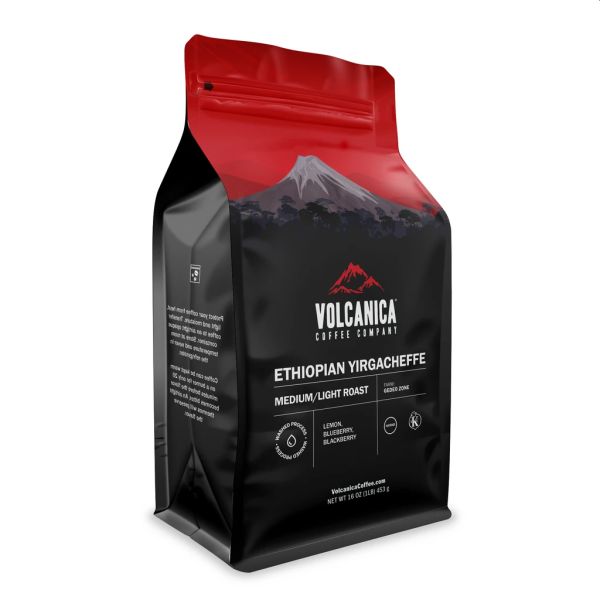
So, those who love brilliant flavors will love Volcanica Yirgacheffe Coffee. But those with stomach acidity issues might want to stay away. High acidity often accompanies coffees that have exotic flavors and distinctive taste notes. This one’s no different.
Volcanica Ethiopian Yirgacheffe Coffee comes with a medium to light roast. It’s expertly roasted to bring forth the taste notes. Volcanica coffee points to flavor notes of lemon, blueberry, and blackberry.
Coffee beans are grown at an elevation of nearly 3000 feet. The excellent weather and the rich volcanic soil provide nourishment for this wonderful coffee. Ethiopia is, after all, the native land of coffee. And this coffee shows there is something special to love.
Volcanica offers these as whole coffee beans, though grinds for espresso, French press, and drip coffee machines are available too.
Coffee Highlights:
- USDA Certified Organic coffee
- Additional certifications: Fair Trade, Kosher
- Ethiopian Yirgacheffe Coffee is famous for its rich flavor and taste notes
- Single-origin, high-grown coffee (elevation 3000 feet)
- Medium/light roast
Death Wish Coffee Whole Bean Coffee
Death Wish Coffee is famous for being the strongest coffee available. It’s highly caffeinated and easily delivers the caffeine rush we all crave. Though it’s mostly talked about for its caffeine content, Death Wish Coffee possesses other virtues as well.
Though it’s a blend, Death Wish Coffee utilizes only organic coffee beans. They’ve got the USDA certification to prove it. A Fair Trade certification gives these organic coffee beans an extra push.
The need for high caffeine makes the use of Robusta beans necessary. Though fairly popular, Robusta isn’t as popular as the milder and better-flavored Arabica coffee. Yet, Robusta has a higher caffeine content and brings that distinctive “strong” taste we coffee lovers enjoy.
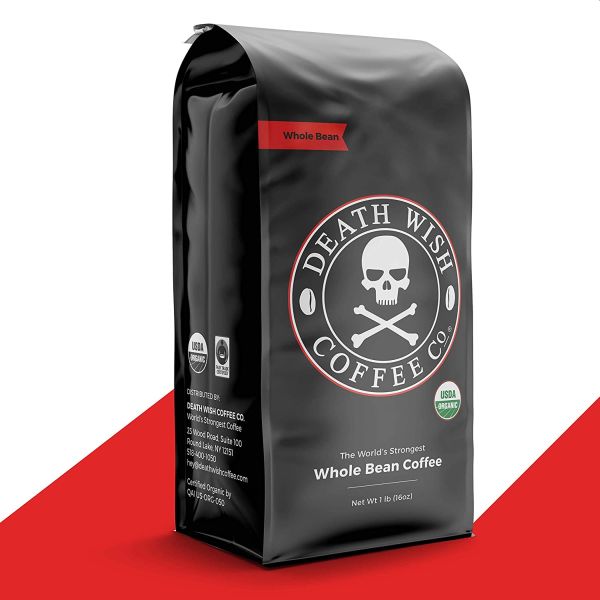
Masterful blending and roasting of the beans fulfills all these aims. The resultant dark roast is rich in caffeine and has a strong taste. It might sometimes come to the edge of feeling bitter, but it never really crosses that line. Bitter cherry and dark chocolate profile and taste notes make their presence known.
Coming back to the start, remember that this is highly caffeinated coffee. It delivers a mean caffeine kick, has a good flavor, and will get you moving. But don’t forget to watch your caffeine intake. A standard 8 oz cup of drip coffee is very likely to take you over the FDA recommended caffeine intake of 400 mg a day.
Enjoy Death Wish Coffee and its great flavor and energy, but don’t forget to moderate your coffee intake.
Coffee Highlights:
- USDA Certified Organic coffee
- Fair Trade Certified
- Blend of Robusta and Arabica beans
- Very high caffeine content
- Dark roast
Java Planet Colombian Single Origin Organic Coffee Beans
High-quality Colombian Arabica coffee beans show off their organic credentials with this coffee. Java Planet Colombian Single Origin Organic Coffee Beans show off the rich flavors of Colombian coffee. Beautiful fruit tones come front and center and highlight the gourmet origins of these beans.
Colombian coffee is famous for its rich flavor and taste notes. It’s also a naturally low-acid coffee that’s inclined to go easy on your stomach. That combination alone would be reason enough to love Java Planet coffee beans. Thankfully, it goes further and gives us more reasons to enjoy it.
Java Planet Colombian Single Origin Organic Coffee Beans are certified USDA Organic and a member of the Rainforest Alliance. The coffee is non-GMO and grown without the use of harmful chemicals.
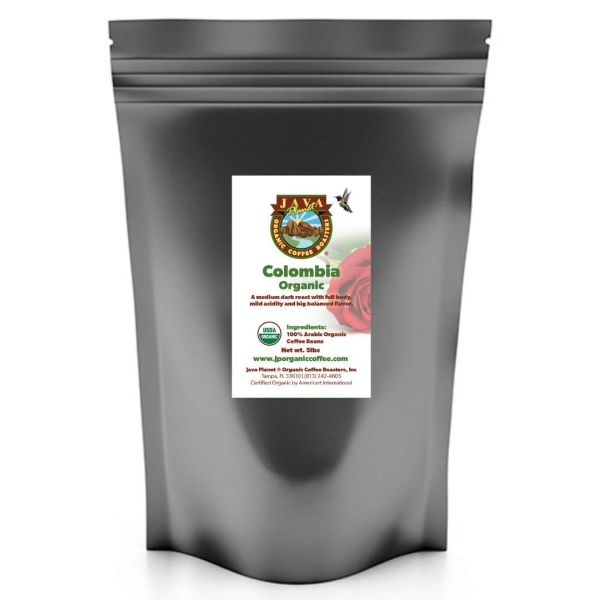
A medium-dark roast gives the beans a balanced flavor, low acidity, and full body. I feel it’s overkill to go for a medium-dark roast on what’s being presented as a single-origin gourmet coffee. Experiencing the stronger flavor notes with a medium roast would be far more appreciable.
Presumably, the single-origin label here comes with a wider meaning, that of the nation. These probably aren’t the finest coffee beans Colombia has to offer, but then again, that’s not our priority here.
Java Planet Colombian Single Origin Organic Coffee Beans is a great-tasting coffee with good value and excellent credentials.
Coffee Highlights:
- USDA Certified Organic
- Certified by Rainforest Alliance
- Single-origin coffee from Colombia
- Medium-dark roast
See buying options and pricing
Ethical Bean Fairtrade Organic Sweet Espresso Whole Bean Coffee
Ethical Bean Coffee company really wants to live up to its name. Or maybe they want to drive the point home for users. Either way, it’s a good thing that greater attention is being paid to the ethics of coffee-growing businesses. That part’s handled by the Fair Trade Certification of these coffee beans.
There’s also the USDA Organic certification to qualify Ethical Bean Fairtrade Organic Sweet Espresso Whole Bean Coffee for a spot on our list. Of course, certifications alone don’t cut it. Quality of coffee beans, their roast, and flavor are the chief components of any offering.
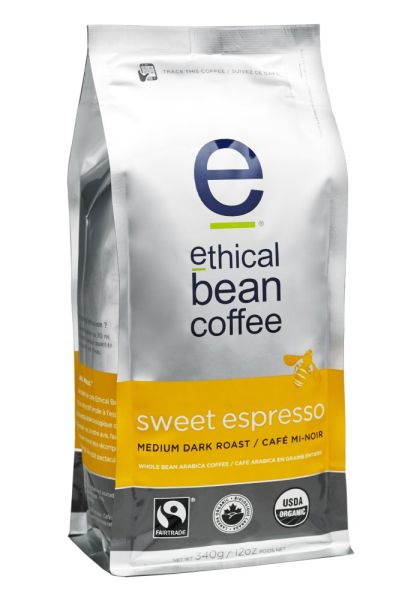
This coffee is a medium-dark roast that delivers a cup with medium body and good flavor. Notice that this is marked as an espresso roast. Put simply, espresso roast isn’t so much of a specific roast as it is an advice by the roaster. It’s a way for the roaster to say “these beans work best with espresso.”
As such, these beans have a medium acidity with a good flavor. Taste tones of baker’s chocolate are evident, as is the skill of the masterful slow roast.
Ethical Bean Fairtrade Organic Sweet Espresso Whole Bean Coffee is small-batch roasted. Each package has a QR code that makes the coffee beans traceable. This includes information like where the coffee was grown and its roast date. Pretty handy and interesting touch!
Coffee Highlights:
- USDA Certified Organic
- Fair Trade Certification
- Medium-dark roast, recommended as ‘espresso roast’
Tiny Footprint Coffee – Organic Cold Brew Whole Bean Coffee
Tiny Footprint Coffee wants to stay true to its name. Specifically, they want a low carbon footprint for themselves and their products. A member of the Mindo Cloudforest Foundation, the company is invested in the ideals of conservation and low carbon emissions.
According to Tiny Footprint Coffee, it takes them four pounds of carbon to grow a pound of coffee. So, they 54 pounds worth of trees to offset this footprint. That’s the way to go!
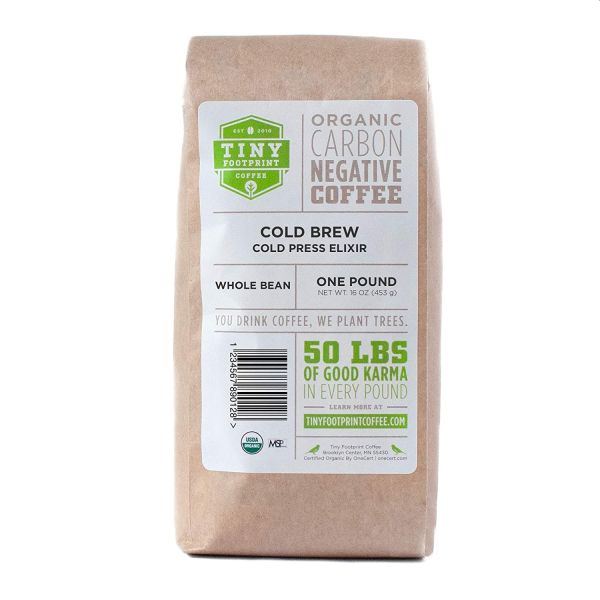
Organic coffee fits in beautifully with these ideals. You’ve got a good start on lowering the environmental footprint by quitting the use of chemicals like pesticides and insecticides. Their claims of good karma are matched by the good coffee they pack.
The coffee is 100% shade-grown Arabica that’s rich in flavor and taste. Recommended for cold brew, the beans are a mix of light and dark roasts. The blend highlights the rich taste notes of the beans with the light roast, while the dark roast brings a touch of the strong taste of coffee.
Tiny Footprint Coffee claims a taste profile of sweet, silky richness. It makes a good cold brew and is pretty good when used with conventional brew methods too. Personally, I enjoy this as a coffee for cold brew. I’d have loved it if the cold brew were stronger, but I guess we can’t have everything. And that’s a pity.
Coffee Highlights:
- USDA Certified Organic
- Certified Fair Trade
- Blend of light roast and dark roast beans
- Roaster recommended for cold brew
Fresh Roasted Coffee LLC, Organic Mexican Chiapas Coffee
Fresh Roasted Coffee LLC, Organic Mexican Chiapas Coffee is a single-source coffee from Tapachula, Chiapas, Mexico. The region is near Mexico’s border with Guatemala. While proximity to the region is a crude metric, there is a semblance of quality with gourmet Guatemalan coffee.
To be fair, Mexican coffee doesn’t often hit the spot as compared to better established gourmet options. And I wouldn’t quite expect this coffee to be up there. But it’s a pleasant surprise how flavorful, yet mild this coffee is. Plus, the pricing is attractive, to say the least.
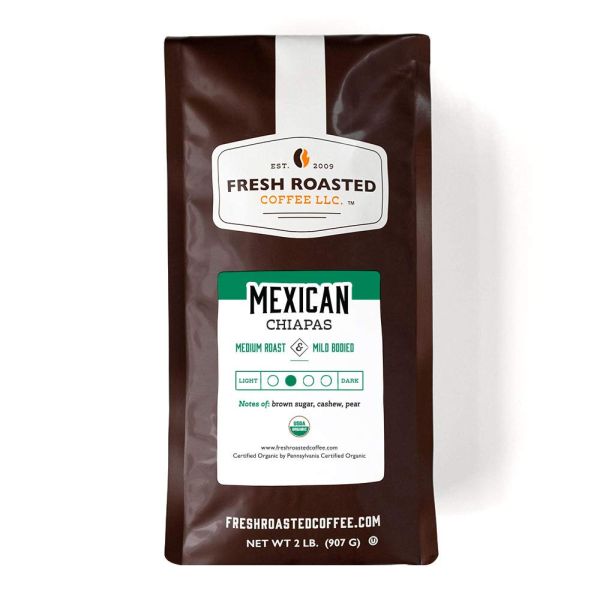
Certified USDA Organic and Kosher, the beans used are flavorful and high-quality. The offering is 100% Arabica beans of the Catimor and Bourbon varietals.
The medium roast beans are rich in flavor and have remarkable taste notes. You’ll find notes of pear, brown sugar, and cashews matching up to a clean finish. The mild body adds more to the brew and the quality of the beans.
Freshly roasted beans are the USP of Fresh Roasted Coffee LLC. Most small batch artisan roasters try to get their coffee beans roasted as close to dispatch as possible. This ensures that the customer gets freshly roasted coffee and can enjoy it to the max.
Coffee Highlights:
- USDA Certified Organic
- Kosher
- Arabica beans of the Catimor and Bourbon varietals
- Single-origin coffee
- Medium roast
- Excellent value for money
Kicking Horse Coffee, Grizzly Claw Whole Bean Coffee
Creative naming and blends that knock the socks right off are the highlights of Kicking Horse Coffee for me. Grizzly Claw is a dark roast blend of coffee beans sourced from Central and South America.
It makes a rich brew with taste notes of dark chocolate and brown sugar. The blend is strong and flavorful, which makes it suitable for practically all coffee brewing methods. Kicking Horse specifically mentions French press, drip coffee, pour over, and cold brew.
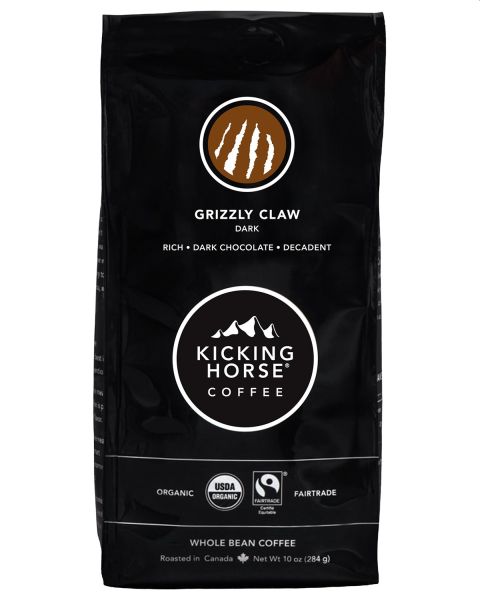
Grizzly Claw blend is USDA Certified organic. The coffee is also certified Fair Trade and Kosher. The shade-grown beans are carefully roasted to deliver this strong and sensible blend. The dark roast brews lush and aromatic coffee that’s rich in flavor.
The blend is excellent and the smaller packages are resealable. However, if you choose to buy a larger bag, like the 2.2 pounds, have a coffee canister handy. The larger bags aren’t resealable, so a canister is necessary.
It’s better to keep any coffee beans in a canister, even if you have a resealable bag. A canister should be airtight and opaque for best results.
Coffee Highlights:
- USDA Certified Organic
- Certified Fair Trade and Kosher
- Blend of 100% Arabica beans from Central and South America
- Dark roast
Mayorga Organics Café Cubano Roast
Mayorga feels like a brand that has been around since forever. Perhaps one of the companies that have centuries old traditions with coffee trade. Founded in 1997, the brand is tolerably old (and young), but not nearly as ancient as my flight of imagination perceived.
Nevertheless, I see it to the credit of this coffee that it feels so well acquainted. In a way, it’s almost a classic. Plus, the Café Cubano is an impressive dark roast. There is a sweet, syrupy smokiness to this roast, with hints of vanilla. The dark roast brews a decidedly strong cuppa and is smooth.
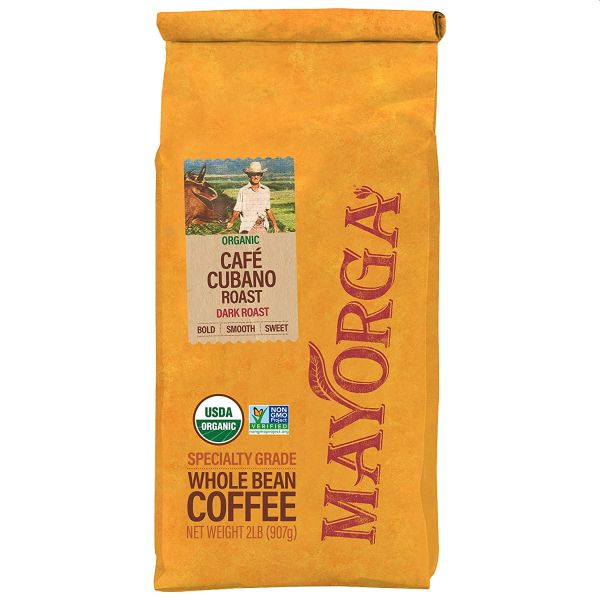
Coffee beans are sourced from Peru, Honduras, and Nicaragua. The specialty blend then takes shape to the dark roast that delivers a bold cuppa with a clean finish. Mayorga Organics coffee is slow-roasted in small batches so consumers have access to freshly roasted beans.
The coffee is shade-grown and low in acidity. Its low acidic content is more due to the growing regions than other factors, though the dark roast plays a part as well.
Coffee beans used for the Mayorga Organics Café Cubano Roast are USDA Certified Organic. The brand has several other certifications and verifications including non-GMO, Kosher, and Direct Trade.
Interestingly, while this is a Cuban-style dark roast, the product itself doesn’t have any contents originating from Cuba.
Coffee Highlights:
- USDA Certified Organic
- Other certifications: Non-GMO verified, Direct Trade, Kosher
- Blend of shade-grown coffee beans from Honduras, Peru, and Nicaragua
- Cuban-style dark roast
See pricing and buying options
The Organic Coffee Co. Sumatra Mandheling Whole Bean Coffee
Sumatra Mandheling Whole Bean Coffee from The Organic Coffee Co. brings whole bean coffee from one of the most famous coffee-growing regions. Plus, there’s the organic touch to this excellent Sumatra coffee.
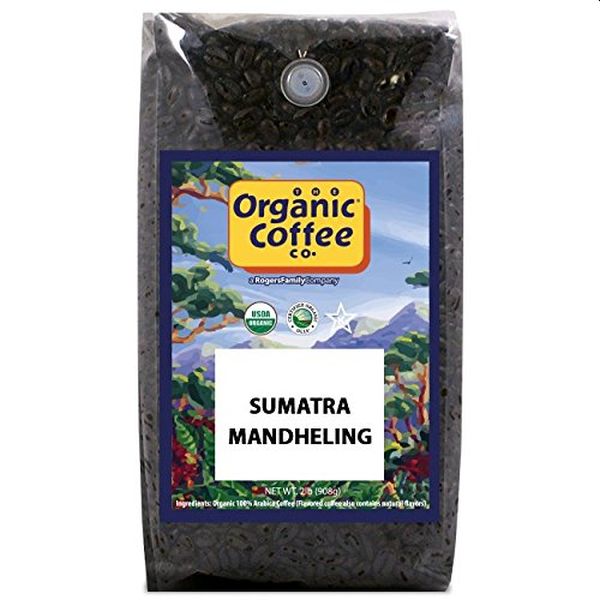
The single-origin coffee from Sumatra, Indonesia, gets a light roast so its exquisite taste notes and flavors are highlighted. It’s a full-bodied coffee with a lovely aroma and impressive flavor. The Organic Coffee Co. says that the coffee is suited for pretty much all brewing methods. Whether you prefer pour over coffee or espresso, this one will get along just fine!
Given the name of the company, it should be no surprise that The Organic Coffee Co. is selling beans that are USDA Certified Organic. The carefully roasted beans are kosher and have a lovely profile.
Coffee Highlights:
- USDA Certified Organic
- Kosher
- Single origin Arabica beans from Sumatra, Indonesia
- Light roast
Organic Coffee Beans At The Top
Organic everything is the buzzword of the moment. But there are some tangible benefits to buying organic products, beyond the marketing buzz. And thanks to consumer interest, there’s a long list of businesses willing to make things happen.
Buying the best organic coffee beans will shower users with plenty of choices and high-quality options. These include much sought-after gourmet coffee beans and more affordable blends alike. Overall, the quality and available choices are remarkable. With this selection, we hope to present some of the best organic coffee options to make your choice easier.

